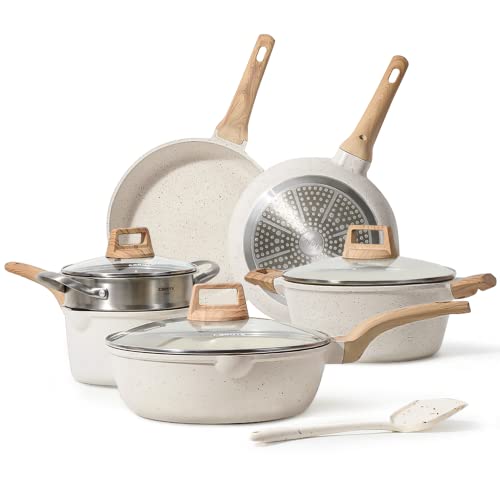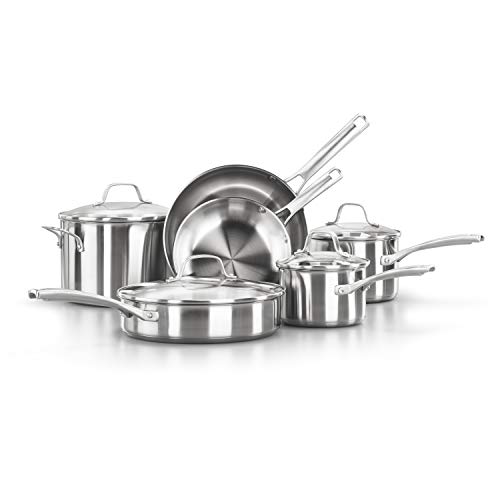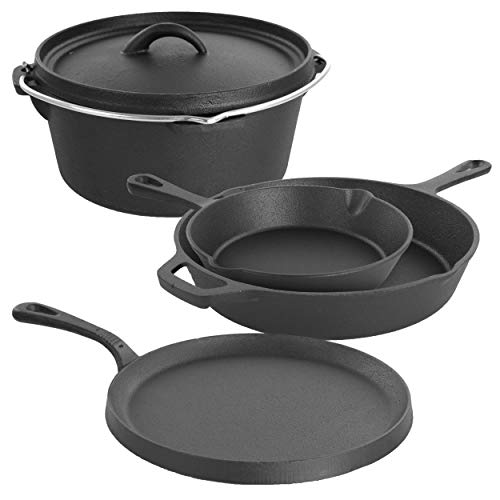Cookware is an essential part of every kitchen. However, choosing the right type of cookware can be quite challenging since options available in the market are numerous. Each material has its advantages and disadvantages. To help you make an informed decision, we have compiled a list of popular cookware materials and their unique characteristics. In this blog post, we will discuss non-stick cookware, stainless steel cookware, aluminum cookware, copper cookware, and cast iron cookware. By the end of this post, you’ll have a good understanding of the pros and cons of each material so you can choose the best one for your kitchen needs.
Table of Contents
Characteristics Of Cookware Materials
Choosing the best cookware material for your kitchen can be a daunting task. With so many different materials available, how do you know which is the right one for you? In this blog post, we will explore the characteristics of different cookware materials to help you make an informed decision.
Stainless Steel: One of the most popular materials for cookware due to its durability and versatility. Stainless steel cookware is resistant to scratches and dents, making it a great long-term investment. It is also non-reactive, meaning it won’t interact with acidic foods, so you don’t have to worry about any metallic taste in your meals.
Aluminum: A great choice for those on a budget, aluminum is lightweight and affordable. It conducts heat well, ensuring even cooking throughout your pot or pan. However, aluminum can react with acidic foods, causing it to discolor or warp over time.
| Cookware Material | Pros | Cons |
|---|---|---|
| Stainless Steel | Durable, non-reactive, versatile | Can be heavy and expensive |
| Aluminum | Affordable, lightweight, conducts heat well | Can react with acidic foods, may warp or discolor over time |
| Copper | Excellent heat conductivity, aesthetically pleasing | Expensive, requires regular maintenance |
Copper: Highly sought after for its excellent heat conductivity, copper cookware heats up quickly and responds to temperature changes faster than any other material. Its aesthetic appeal is also a bonus, enhancing the look of any kitchen. However, copper is an expensive choice and requires regular maintenance to keep it looking its best.
In conclusion, the best cookware material for you ultimately depends on your personal preferences, cooking habits, and budget. By weighing the pros and cons of each material, you can make an informed decision and choose the best cookware for your culinary needs.
Non-Stick Cookware: Pros And Cons
Non-stick cookware has become increasingly popular in recent years for its convenience and ease of use. However, there are some pros and cons associated with this type of cookware that every cook should keep in mind when shopping for the best cookware material.
Pros of Non-Stick Cookware
- Non-stick cookware requires less oil or butter when cooking, which can promote healthier meal preparation.
- Cleaning is a breeze, as food residue slides right off the surface of the non-stick coating. This can save time and effort when washing dishes.
- Food is less likely to burn or stick to the surface, resulting in more consistent cooking and better tasting dishes.
Cons of Non-Stick Cookware
- Scratching: Abrasives and sharp utensils can scratch the non-stick surface, reducing its effectiveness and potentially releasing harmful chemicals.
- Heat Limitations: Non-stick cookware should not be used on high heat, as it can release toxic fumes that can be harmful if inhaled.
- Durability: Non-stick cookware tends to have a shorter lifespan than other types of cookware, with its surface wearing down over time and losing its non-stick properties.
Ultimately, the decision to use non-stick cookware depends on personal preference and cooking habits. While it may be a convenient option for some, others may prefer the durability and versatility of stainless steel or the heat retention of cast iron. Whatever cookware material you choose, be sure to follow proper use and care instructions for the best results and longest lifespan.
Stainless Steel Cookware: Durability And Versatility
Stainless steel cookware is one of the most popular types of cookware available in the market today. It is a popular choice among chefs and home cooks alike because of its durability and versatility. Stainless steel is a metal alloy composed of iron, chromium, and other elements. It is known for its high resistance to rust and corrosion, making it a reliable and long-lasting material for cooking.
One of the best things about stainless steel cookware is its durability. It is a very sturdy material that can withstand high temperatures and regular use without breaking down, chipping, or scratching easily. This makes it ideal for everyday cooking, as well as for cooking in a professional setting. Additionally, stainless steel is easy to clean and maintain, making it a hassle-free choice for many cooks.
| Pros of Stainless Steel Cookware | Cons of Stainless Steel Cookware |
|---|---|
| – Durability and longevity – Non-reactive with acidic foods – Easy to clean and maintain – Compatible with all cooktops | – Poor heat distribution – Expensive compared to other materials – Can be heavy and hard to handle |
Stainless steel cookware is also very versatile. It is non-reactive with acidic foods, which is important because it will not change the taste of the food or cause it to discolor. This makes it a great choice for cooking tomatoes, citrus fruits, and other acidic ingredients. Additionally, stainless steel is compatible with all cooktops, including induction. This means that it can be used on any type of stove, making it a versatile choice for any kitchen.
In conclusion, if you are looking for the best cookware material that is durable, easy to clean, and versatile, then stainless steel cookware is definitely the way to go. While it may be a bit more expensive than other materials, its longevity and reliability more than make up for the extra cost. With proper care and maintenance, stainless steel cookware can last a lifetime, making it a worthwhile investment for any cook or chef.
Aluminum Cookware: Affordable And Lightweight
When it comes to selecting the best cookware material, you will find a plethora of options in the market. One of the popular choices is aluminum cookware. As the name suggests, aluminum cookware is made from aluminum, making it one of the most affordable and lightweight options available. Despite being budget-friendly, it offers several benefits that make it a favorite among home chefs.
One of the significant advantages of aluminum cookware is its excellent heat conductivity. Aluminum heats up quickly and evenly, making it an ideal choice for cooking dishes that require precise temperature control. This unique characteristic of aluminum cookware ensures that your food is cooked evenly and consistently, regardless of the heat source. Additionally, aluminum cookware is compatible with most stovetops, including gas, electric, and glass top.
| Pros of Aluminum Cookware | Cons of Aluminum Cookware |
|---|---|
| – Lightweight – Affordable – Excellent heat conductivity – Easy to clean | – Reacts with acidic foods – Not dishwasher safe – Can warp or dent quickly |
Another advantage of aluminum cookware is its easy maintenance. It is non-reactive, so you won’t have to worry about the material leaching into your food. Additionally, it is easy to clean and maintain. However, one of the downsides of aluminum cookware is that it can react with acidic foods and discolor them. Therefore, it is recommended to avoid cooking tomato-based sauces, citrus marinades, or vinegar-based dishes in aluminum cookware.
In conclusion, if you are a beginner or looking for a budget-friendly option, aluminum cookware is an excellent choice. Its affordability, lightweight, and excellent heat conductivity make it perfect for everyday use. However, it’s essential to note that you should use caution when cooking acidic foods to avoid discoloration. With proper care and maintenance, aluminum cookware can last for years and make your cooking experience convenient and comfortable.
Copper Cookware: Conductivity And Aesthetics
Copper cookware is a popular choice among professional chefs and home cooks alike due to its excellent heat conductivity and beautiful aesthetics. Copper is considered one of the best cookware materials as it heats up quickly and evenly, allowing for precise temperature control, which is especially important for delicate dishes such as sauces. The natural properties of copper also make it an attractive addition to any kitchen.
One of the major advantages of using copper cookware is its ability to distribute heat evenly across the entire surface of the cooking vessel. This is because copper is an excellent conductor of heat, second only to silver. This means that copper cookware can quickly and efficiently transfer heat to the food, ensuring that it is cooked evenly and to perfection. Copper cookware is ideal for cooking dishes that require precise temperature control, such as risotto or sauces.
| Pros of Copper Cookware | Cons of Copper Cookware |
|---|---|
| Incredible heat conductivity | Expensive compared to other materials |
| Beautiful design and appearance | The metal can react with acidic foods, causing a metallic taste |
| Durable and long-lasting | Requires regular polishing and maintenance to retain its appearance |
In addition to its excellent heat conductivity, copper cookware also adds a touch of elegance and sophistication to any kitchen. Its highly polished exterior and warm, reddish-orange hue are especially eye-catching, and can transform a kitchen into a professional-grade culinary space. Copper cookware is available in a variety of designs and styles, from sleek modern pieces to classic, vintage-inspired cookware sets.
However, it’s important to note that copper cookware can be quite expensive compared to other materials, making it a bit of an investment. Additionally, copper can react with acidic foods, such as tomatoes or vinegar, causing a metallic taste. This means that copper cookware is not suitable for all types of dishes, and should be used with care.
In conclusion, copper cookware is an excellent choice for those looking for cookware with excellent heat conductivity and beautiful design. While it may be a bit more expensive than other materials, it is durable and long-lasting, and adds a touch of elegance to any kitchen. However, it’s important to remember that copper cookware may not be suitable for all types of dishes, and requires regular polishing and maintenance to retain its appearance.
Cast Iron Cookware: Heat Retention And Longevity
Cast iron cookware has been around for centuries, and there’s no doubt that it’s still a popular choice for many home cooks out there. If you’re someone who loves to cook, then you know that having the right tools in the kitchen can make all the difference. When it comes to the best cookware material out there, cast iron is definitely a go-to option for many.
One of the best things about cast iron cookware is its heat retention. Cast iron is a very dense material, which means that it’s able to hold onto heat for a long time. This makes it a great choice for dishes that need to be cooked low and slow, such as stews, roasts, and even baked goods. Cast iron also heats up very evenly, so you don’t have to worry about hot spots in your food.
| Pros of Cast Iron Cookware | Cons of Cast Iron Cookware |
|---|---|
| Longevity | Heavy |
| Non-stick surface with proper seasoning | Requires maintenance |
| Can be used on almost any cooking surface, including induction | Not dishwasher safe |
In addition to its heat retention capabilities, cast iron cookware is also known for its longevity. If you take care of your cast iron, it can last you a lifetime. In fact, many people still use cast iron pans that have been in their families for generations. Cast iron cookware is also extremely durable, which means that you don’t have to worry about it getting scratched, dented, or damaged easily.
While cast iron cookware certainly has its pros and cons, it’s clear that its heat retention and longevity are two major advantages. With proper care and maintenance, a cast iron pan can be a staple in your kitchen for many years to come.
Frequently Asked Questions
Non-stick cookware is easy to clean and requires less oil for cooking. However, it can scratch easily and may release harmful fumes at high temperatures.
Stainless steel cookware is resistant to corrosion and rust, making it durable over time. It can also be used with a variety of cooking methods, including induction cooking.
Aluminum cookware is lightweight, affordable, and conducts heat well. However, it can react with acidic foods and is prone to warping.
Copper cookware offers excellent heat conductivity, allowing for precise temperature control. It also has a unique aesthetic appeal. However, it can be expensive and requires more maintenance than other materials.
Cast iron cookware retains heat well and can last for generations if cared for properly. It is also versatile and can be used on the stovetop, in the oven, or over a campfire.
When purchasing cookware, consider your cooking needs, budget, and preferred materials. Also, look for high-quality construction and ergonomic handles for comfortable and safe use.
To care for your cookware, always follow the manufacturer’s cleaning instructions and avoid using abrasive cleaners or metal utensils that can scratch the surface. Store your cookware properly to avoid damage, and consider using protective sleeves or dividers to prevent scratches and dents.

Hi, I’m Maria from Los Angles. Born and raised in a family of avid home cooks, developed a love for food at a young age. I remember spending weekends in the kitchen with her parents, learning how to make family favorites like lasagna and chocolate chip cookies. After graduating from college, started working as a marketing manager for a tech company, but I found myself spending all of her free time in the kitchen. Then I decided to share my experiences on FindForKitchen blog.














